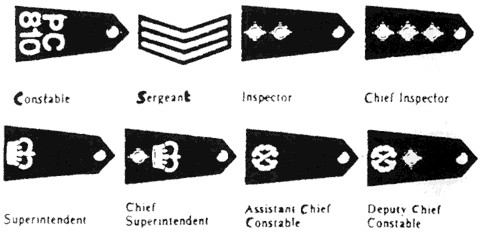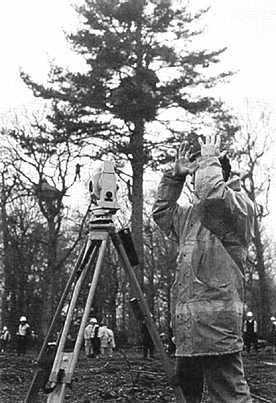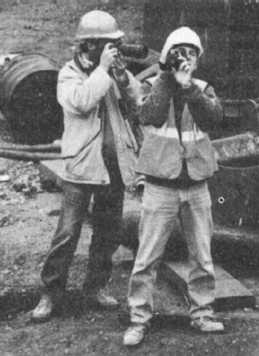
Once the politicians have made their final decision, and the legal order to build the road has been made, the uphill struggle to stop the paper approval becoming grim concrete reality begins - and that's what this guide is about. Remember that there are loads of roads which have passed all political and legal hurdles to construction, but aren't being built. The key to adding your road scheme to this list is to vanquish all political desire to sign the contract and build the road.
Government will, of course, attack anyone who dares to step outside the democratic charade to challenge its power. So expect all the usual lines: you'll be rentamob, outsiders, anti- democratic, scroungers, eco-fascists, etc. Join the club! Repellent as politicians are, it's important to take them on at an early stage, to counter their arguments, to build support, and to knock the case for the road. Unfortunately, this means playing the political game to some extent; use them, but never trust them or rely on them! Politicians are not brave - the more they see resistance mounting and trouble on the horizon, the less tarmac-happy they become. However, they must be able to back down without losing face, so think of political escape routes, such as budget cuts. Be aware that if you raise the stakes inappropriately, or at the wrong time, the harder it may become for politicians to publicly retreat.
Remember that different levels of government often don't agree; if the road is planned by the State, for instance, the support / opposition of local and parish councils will be an important factor. Identify which level of government the pressure is coming from, and concentrate on that. There are numerous books on lobbying politicians see Chapter xx.
 These technicians make sure the road
gets built in the right place. They wear high-visibility clothing and hard
hats on worksites, like everyone else, but often discard these when surveying
untrashed areas, to be less conspicuous. They work in pairs, threes or fours,
and may be accompanied by security guards. They carry theodolite and
reflectors, which are very expensive and delicate kit. If this gets broken,
the surveyors don't work! Sometimes, they may carry what looks like a metal
rucksack with a huge aerial. This is extremely expensive, sensitive satellite
positioning apparatus.
These technicians make sure the road
gets built in the right place. They wear high-visibility clothing and hard
hats on worksites, like everyone else, but often discard these when surveying
untrashed areas, to be less conspicuous. They work in pairs, threes or fours,
and may be accompanied by security guards. They carry theodolite and
reflectors, which are very expensive and delicate kit. If this gets broken,
the surveyors don't work! Sometimes, they may carry what looks like a metal
rucksack with a huge aerial. This is extremely expensive, sensitive satellite
positioning apparatus.
Surveyors will work before anything else happens; in fact, surveying is an important part of the road planning process. There will be a burst of surveying activity in the weeks and months leading up to the start of actual work, and this will continue thereafter throughout the construction process. Their work is essential, and must be accurate. For this reason, it is vital and relatively easy to sabotage it. If you stop the surveying, the bulldozers and chainsaws simply don't know where to go (see "Stopping Surveyors" - Chapter 10).
The higher the profile of your scheme, the higher the level of security organisation you will face. Companies like Reliance and Group 4 (used extensively on British road protests) have a rigid hierarchy, indicated by differences in uniform, often by hat colour. All guards should wear high-visibility jackets and hard hats. Some firms make their guards wear identity numbers; if they don't, demand that they do. They are usually divided into teams of about 15-20, led by a team leader. There will often be specialist teams, most notably "rapid response" units, who roam about in Land Rovers until they get called to deal with "trouble". There will be other layers of "management" above the teams.
Guards will be mostly male, with most of the bottom level coming straight from the dole, being paid peanuts and treated badly by their "superiors". Many may not like the job, but are victims of financial necessity. This is the level most likely to walk out, turn a blind eye to holes in security fences etc, or to leak information to protesters. Hence, they are trusted with minimal responsibility; work on sowing discontent! There will of course be a sprinkling of psychos, rambo fantasists, and people turned down by the army or police for being too aggressive, especially at the team leader level (see end of Chapter 10 for ideas on dealing with violence). The most senior guards are most likely to be army lieutenant types, and will generally avoid getting their hands dirty.
It's worth developing a relatively peaceful (if untrusting) co-existence with security, as you'll be seeing a lot of them, and they have every opportunity to put the boot in, steal your gear, trash camps, etc, if hostility rises. Of course, some may do these things anyway. Guards can be a source of tip-offs if you cultivate them, especially as they have little loyalty to anyone but their pay-packets. Remind them that they have an interest in seeing protests continue for as long as possible - if the campaign dies down, the ones at the bottom quickly get laid off. They will probably be brainwashed to believe that you intend to do hideous things to them, and their matey-macho culture reinforces this.
Although they're there to do what they're told, earn money, and get the road built, they will be affected by what they see, and by how you relate to them. Strike the balance between undermining their working efficiency at every opportunity and not making them want to batter you. Make them hate their bosses much more than they hate you, and try and make them understand what you're doing and why you're there.
Legally, security guards are empowered to use "minimum reasonable force" to remove trespassers from private land, and are supposed to ask you to leave before touching you. In practice, they'll grab you as soon as they catch you on a work site, and chuck you off. Don't expect the police to protect you from "unreasonable" force. Guards have no more legal power than anyone else when they venture off the private land they are protecting (eg. onto the public highway) - use this to your advantage.
 The DoT has used private detectives to
photograph, spy on, serve legal papers on, film, and generally harass
activists since the protests at Twyford Down in 1992. One firm, Bray's of
Southampton, has cornered the market in this sad and shady speciality. It is
highly likely that you will face some similar type of snooping, which will be
separate from the police's evidence gathering - although pooling of
information is almost guaranteed.
The DoT has used private detectives to
photograph, spy on, serve legal papers on, film, and generally harass
activists since the protests at Twyford Down in 1992. One firm, Bray's of
Southampton, has cornered the market in this sad and shady speciality. It is
highly likely that you will face some similar type of snooping, which will be
separate from the police's evidence gathering - although pooling of
information is almost guaranteed.
They're not doing this for your benefit - the information they collate can do nothing but harm you, sooner or later, and you will have no control or knowledge of what is done with it. We suggest you make life as difficult and unpleasant as possible for them at every opportunity.
In evictions, a tree "surgeon" will go up in trees to lop branches, either climbing with spiked boots, or riding in a cherry-picker. Their job theoretically doesn't include pulling protesters from trees, but they often do. Most chainsaw operators will be based relatively locally. They wear hard hats and protective trousers, boots and visors.
As a campaign, you'll have to think about how to deal with the police as they will turn up at everything you do - like a bad smell. You may consider doing some "liaison" with them. But remember that behind every smiling face of the "nice cop" is a whole army of the real police - Special Branch, M15 and friends - tapping campaign phones and writing reports. Basically, they exist to screw up your plans! Always have a cynical attitude to the police, and never trust them.
This may all sound very negative, and some would argue that all cops are individuals and should be treated as such. The trouble is that when working they are not individuals. They are part of an army and follow the orders of people who you don't get a chance to reason with. They always do follow orders.
The police have a strict hierarchy and there will be a cop in charge on the ground at all times. If you need to speak to the police, make sure you speak to the most senior one, not to someone who has no command or control. All police should have identification (numbers or symbols) on their shoulders and from this you can work out their rank.

We could go on for ages, of course, and mention local media, magistrates, pub landlords, vigilantes, and the numerous other local factions who will do their best to make your life difficult. However, the most important thing to be aware of is how all the local pro-roadies link up to present a web of influence. This may be done by forming a formal group, along with local politicians. The Newbury Bypass Forum, for instance, manipulated local opinion effectively in 1995, presenting a vociferous political lobby to pressurise national government to approve the Newbury Bypass. The most important links will be behind the scenes - local businesses, landowners and politicians all have their hands in each others' pockets. Expose the vested interests!
The roadbuilding agency will then select a shortlist of contractors (often six) who will be invited to submit bids. These contractors will prepare a detailed price estimate of their costs in completing the contract. This represents a significant investment of time and money by each contractor, who must submit their bid (or "tender") by a certain date stated by the roadbuilding agency. The agency will then work through the bids, eliminating them until it awards the contract - often to the lowest bidder.
The construction press will have the latest news on contracts, including which contractors have been shortlisted, and rumours about who is most likely to win. The roadbuilding agency will make an official announcement when it's ready, but the contract will have been sewn up before then. Once a main contract has been signed, stopping the road becomes very much harder. We suggest putting a lot of energy and thought into sabotaging the contract award procedures (see ideas within Chapter 10).
The contract involves some new scheme planning and construction, but also maintenance of a stretch of highway for some years, all at the consortium's own cost. At the end of this time, the consortium will be reimbursed by the Treasury according to a number of factors, including traffic levels - a reward for generated traffic! The main difference with a DBFO contract is its greater scope and complexity, and a higher burden of risk on contractors. If the road you're fighting is DBFO or private finance, we suggest exploiting all the extra issues raised. For background info on DBFOs contact Transport 2000 or ALARM UK (see Chapter 16).
Road Alert!
EMAIL: info@roadalert.org.uk